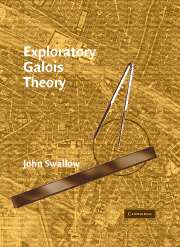Book contents
- Frontmatter
- Contents
- Preface
- Introduction
- 1 Preliminaries
- 2 Algebraic Numbers, Field Extensions, and Minimal Polynomials
- 3 Working with Algebraic Numbers, Field Extensions, and Minimal Polynomials
- 4 Multiply Generated Fields
- 5 The Galois Correspondence
- 6 Some Classical Topics
- Historical Note
- Appendix: Subgroups of Symmetric Groups
- Bibliography
- Index
4 - Multiply Generated Fields
Published online by Cambridge University Press: 06 July 2010
- Frontmatter
- Contents
- Preface
- Introduction
- 1 Preliminaries
- 2 Algebraic Numbers, Field Extensions, and Minimal Polynomials
- 3 Working with Algebraic Numbers, Field Extensions, and Minimal Polynomials
- 4 Multiply Generated Fields
- 5 The Galois Correspondence
- 6 Some Classical Topics
- Historical Note
- Appendix: Subgroups of Symmetric Groups
- Bibliography
- Index
Summary
We now extend our investigation to fields generated over a field K by more than one algebraic number, or multiply generated fields. We saw a hint of such fields in section 12.3, where we considered a field K(α) generated by an algebraic number α over a field K(β), itself generated over K by an algebraic number β. In this chapter, we consider several questions concerning fields generated over K by more than one algebraic number:
whether such a field may be generated over K by a single algebraic number;
whether such a field is of finite dimension over K; and
how to specify the structure of such fields via an isomorphism to a quotient ring of a polynomial ring, as we did in section 8.3.
We also examine an important class of fields generated by several algebraic numbers: those that are generated by all of the roots of a polynomial. We then study how to determine isomorphisms from one multiply generated field to another, particularly when the fields are splitting fields. At the end of the chapter, we consider the results of this chapter in the general field-theoretic setting of simple, finite, and algebraic extensions.
Fields Generated by Several Algebraic Numbers
Definition 16.1. Let K be a subfield of ℂ, and let α and β be two algebraic numbers. We denote by K(α, β) the identical fields K(α)(β) = K(β)(α), which we call the field generated by α and β over K.
In support of the preceding definition, note that we may view the set S of all arithmetic combinations of α, β, and elements of K in several ways.
- Type
- Chapter
- Information
- Exploratory Galois Theory , pp. 63 - 102Publisher: Cambridge University PressPrint publication year: 2004



